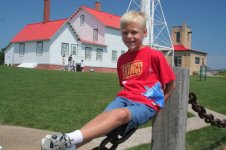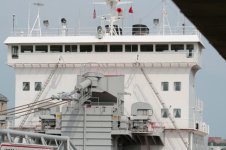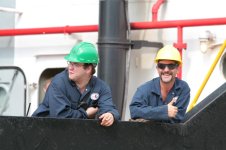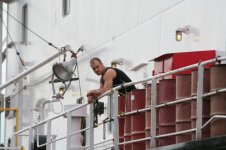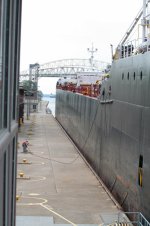You are using an out of date browser. It may not display this or other websites correctly.
You should upgrade or use an alternative browser.
You should upgrade or use an alternative browser.
"..of the big lake they call Gitche Gumee"
- Thread starter rdln
- Start date
- Views: 2542
/ "..of the big lake they call Gitche Gumee"
#11
TMcD_in_MI said:Yeah, I remember it pretty well, although I don't think it hit me right away what exactly had happened. I also remember the howling wind we had here that day - what a bad way for those men to go. I hope when my time comes that I go more peacefully, but that's one thing we don't have much control over.
Gordon Lightfoot's song is always an eery reminder. I wonder if it is as well known around the country as it is here in Great Lakes territory.
Tom
We hear the song quite a bit up here in Maine, but I never really knew what it was about. I had assumed it was about a much older disaster, until reading this thread.
RobS
Super Member
As promised, here are some pics from Whitefish Point and the Soo Locks.
First pic is my youngest son in front of the Whitefish Point Light. The next four are from the locks at Sault Ste. Marie. Goaliedad mentioned how close you can get to the giant freighters and it's true! Each of these pictures is of a freighter in the first lock. The visitors center runs nearly the entire length of the lock.
Enjoy
First pic is my youngest son in front of the Whitefish Point Light. The next four are from the locks at Sault Ste. Marie. Goaliedad mentioned how close you can get to the giant freighters and it's true! Each of these pictures is of a freighter in the first lock. The visitors center runs nearly the entire length of the lock.
Enjoy
Attachments
CRJCaptain
Silver Member
- Joined
- Jul 4, 2003
- Messages
- 133
- Tractor
- Bobcat Toolcat 5600
"This is always a goose bumpy day for me especially when Gordon Lightfoot's song "The Wreck of the Edmund Fitzgerald" is played on local stations."
That's a great, eerie song...haven't heard it in a long time. I went to elementary school with Gordon Lightfoot's cousin in Orillia, Ontario back in the '70s....
That's a great, eerie song...haven't heard it in a long time. I went to elementary school with Gordon Lightfoot's cousin in Orillia, Ontario back in the '70s....
CRJCaptain
Silver Member
- Joined
- Jul 4, 2003
- Messages
- 133
- Tractor
- Bobcat Toolcat 5600
Here's a great link that I found with interactive, 3D simulations of the SS Edmund Fitzgerald:
The Edmund Fitzgerald
The Edmund Fitzgerald
Jethro
Bronze Member
- Joined
- Dec 19, 2003
- Messages
- 87
- Location
- Eastern NC
- Tractor
- Kubota B1550, several Exmark ZTRs, Walker GHS and a 1967 Craftsman Surburban
TMcD_in_MI said:Gordon Lightfoot's song is always an eery reminder. I wonder if it is as well known around the country as it is here in Great Lakes territory.
Tom
Yes it is very well know throughout the rest of the country. I have it on my i-pod. Tony Rice did a great version of it too, I think I actually like it a little better. The story in the song was my only introduction to the wreck. It intrigued me so much that I began to research it.
knute_m
Gold Member
- Joined
- Dec 16, 2005
- Messages
- 408
- Tractor
- Down to my lovable little red Mahindra with FEL, and backhoe.
I debated with myself for almost two weeks before posting this. These are not pleasant remembrances. This may be a gruesome post, but it is about the tough sailing and farming life along the shores of Gitche Gumee (Lake Superior) when I was growing up. It is why we have OSHA. It is why we have ROPS on our tractors.
It’s always a difficult day when the anniversary of the Fitz comes around. One crew member was a fishing partner and beer sipping friend. Another crew member lived next to an uncle. He was a friend to my dad. I graduated from high school with his niece, who held his namesake. Many others were acquaintances. Many came from the South Shore of Lake Superior, just like me. Many were part of a farming community. Sailing on the lakes in the 50s, 60’s and 70s paid the bills so that the family farm could continue.
In 1969 I didn’t know how lucky I was. Uncle Sam selected me to enjoy much warmer climates. Somehow, three cousins and I, along with a number of others from Lake Superior’s land-locked South Shore and North Shore became sailors in Uncle Sam’s Navy -- avoiding the very deadly fate of friends who were randomly chosen to become Marines or soldiers to serve in Southeast Asia. Many of those just a little older, or just a little younger than us, became Great Lakes sailors. The conflict took or maimed many friends from the financially-challenged shores of Lake Superior who had little political influence, nor enough money to avoid the draft. Unfortunatley, many of their names are now engraved on the big black wall in Washington, DC. But, the Lakes also took many, and their names are nowhere, except maybe on lists – like those who went down with the Fitz.
A few weeks after I returned to civilian life in 1975, my friends and former neighbors from the Fitz made the news. I had just moved to the state of Virginia. I so vividly remember the morning that my fiancé asked if I’d ever heard of the Fitzgerald. I still become emotional when I think about it. I remember the difficult phone call to my parents. News was still scarce. We weren’t sure who was on it. But, the local news was reporting that it was fairly certain that it sunk with all crew members.
The event seemed to put a seal on a very sadistic and virulent life.
The great lakes prior to the 1970s were very brutal – they probably still are, maybe just not quite as bad as they were before OSHA. The Fitz just happened to take many lives at one time, during a time when sensational news was just beginning to travel really fast. The Vietnam war was over. News was needed. Big news was big business.
Lake Superior’s many other deaths and sinkings were now only for the locals to remember.
As a kid growing up on a farm at the Head of the Lakes in the 50s and 60s, every day seemed to tell of someone else who was maimed or killed. My ancestors made it through several wars, but not through a life on the Great Lakes. It maimed my dad, my brother, and two of my uncles. It killed two other uncles.
The day of the sinking always recalls a bucketful of molten cast iron poured into boots at the Lingerwood-Mundy foundry about 100 feet from the bow of the Fitzgerald at its winter berth at Fraser Shipyard. It recalls a dropped ore-punching bar falling 40 feet to spear someone below on the Great Northern docks as the ore boat was being loaded. It recalls a loose chain grappling and pulling a leg under a gantry crane wheel at the Berwind coal dock as a boat was being unloaded. It recalls the aberration on a grain belt at the King Midas flour mill pulling the human contents out of a set of coveralls and pulverizing them into unrecognizable dough as it mixed him with flour being loading onto a “Salty” (a saltwater ship, heading out to the Atlantic Ocean through the Soo Locks and the St. Lawrence Seaway).
It happened on our farms too. The Lake workers would take time off to “make hay” on the family farms. It seemed that every haying season reported arms being pulled off in jammed balers. Fathers were impaled with hay hooks. Tractors turned over. How many fingers were shortened while repairing sickle-bar mowers?
When the Big Lake froze over, and everyone was laid off for the winter, logging became king in the great “popple” forests. Need I remind anyone about the dangers of logging?
The stories never seemed to end.
Let us not just remember the crew of the Fitzgerald, but also the many families who sacrificed to make ends meet by supporting the extremely dangerous occupations that surround the Great Lakes.
Knute Maki
It’s always a difficult day when the anniversary of the Fitz comes around. One crew member was a fishing partner and beer sipping friend. Another crew member lived next to an uncle. He was a friend to my dad. I graduated from high school with his niece, who held his namesake. Many others were acquaintances. Many came from the South Shore of Lake Superior, just like me. Many were part of a farming community. Sailing on the lakes in the 50s, 60’s and 70s paid the bills so that the family farm could continue.
In 1969 I didn’t know how lucky I was. Uncle Sam selected me to enjoy much warmer climates. Somehow, three cousins and I, along with a number of others from Lake Superior’s land-locked South Shore and North Shore became sailors in Uncle Sam’s Navy -- avoiding the very deadly fate of friends who were randomly chosen to become Marines or soldiers to serve in Southeast Asia. Many of those just a little older, or just a little younger than us, became Great Lakes sailors. The conflict took or maimed many friends from the financially-challenged shores of Lake Superior who had little political influence, nor enough money to avoid the draft. Unfortunatley, many of their names are now engraved on the big black wall in Washington, DC. But, the Lakes also took many, and their names are nowhere, except maybe on lists – like those who went down with the Fitz.
A few weeks after I returned to civilian life in 1975, my friends and former neighbors from the Fitz made the news. I had just moved to the state of Virginia. I so vividly remember the morning that my fiancé asked if I’d ever heard of the Fitzgerald. I still become emotional when I think about it. I remember the difficult phone call to my parents. News was still scarce. We weren’t sure who was on it. But, the local news was reporting that it was fairly certain that it sunk with all crew members.
The event seemed to put a seal on a very sadistic and virulent life.
The great lakes prior to the 1970s were very brutal – they probably still are, maybe just not quite as bad as they were before OSHA. The Fitz just happened to take many lives at one time, during a time when sensational news was just beginning to travel really fast. The Vietnam war was over. News was needed. Big news was big business.
Lake Superior’s many other deaths and sinkings were now only for the locals to remember.
As a kid growing up on a farm at the Head of the Lakes in the 50s and 60s, every day seemed to tell of someone else who was maimed or killed. My ancestors made it through several wars, but not through a life on the Great Lakes. It maimed my dad, my brother, and two of my uncles. It killed two other uncles.
The day of the sinking always recalls a bucketful of molten cast iron poured into boots at the Lingerwood-Mundy foundry about 100 feet from the bow of the Fitzgerald at its winter berth at Fraser Shipyard. It recalls a dropped ore-punching bar falling 40 feet to spear someone below on the Great Northern docks as the ore boat was being loaded. It recalls a loose chain grappling and pulling a leg under a gantry crane wheel at the Berwind coal dock as a boat was being unloaded. It recalls the aberration on a grain belt at the King Midas flour mill pulling the human contents out of a set of coveralls and pulverizing them into unrecognizable dough as it mixed him with flour being loading onto a “Salty” (a saltwater ship, heading out to the Atlantic Ocean through the Soo Locks and the St. Lawrence Seaway).
It happened on our farms too. The Lake workers would take time off to “make hay” on the family farms. It seemed that every haying season reported arms being pulled off in jammed balers. Fathers were impaled with hay hooks. Tractors turned over. How many fingers were shortened while repairing sickle-bar mowers?
When the Big Lake froze over, and everyone was laid off for the winter, logging became king in the great “popple” forests. Need I remind anyone about the dangers of logging?
The stories never seemed to end.
Let us not just remember the crew of the Fitzgerald, but also the many families who sacrificed to make ends meet by supporting the extremely dangerous occupations that surround the Great Lakes.
Knute Maki
Last edited:
